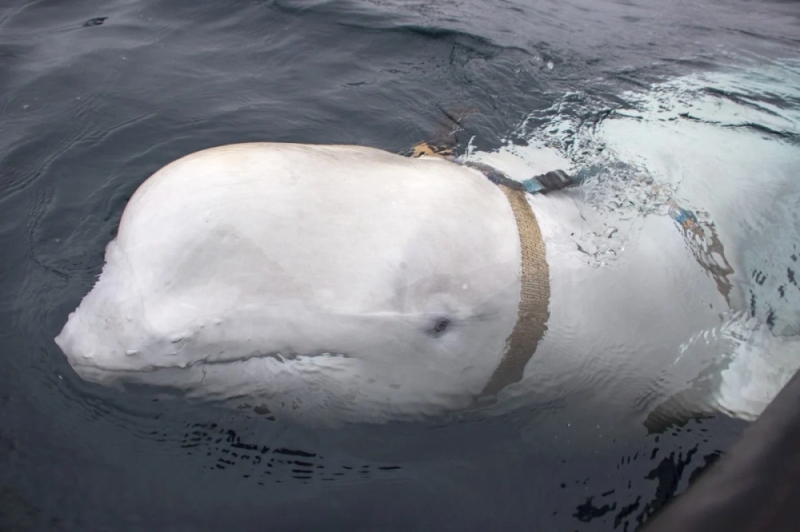‘Russian spy’ whale Hvaldimir found dead in Norway
The white beluga was found off the southwest coast at Risavika Bay by a father and son who were out fishing.

A beluga whale nicknamed Hvaldimir, after his strange harness prompted suspicions he was a Russian spy, has been found dead in the southwest of Norway.
The whale’s carcass was discovered floating off Risavika Bay in southern Norway on Saturday by a father and son who were out fishing, Norwegian public broadcaster NRK reported.
“Hvaldimir was not just a beluga whale; he was a beacon of hope, a symbol of connection, and a reminder of the deep bond between humans and the natural world,” Marine Mind, a nonprofit organisation that had been tracking his movements, said on social media.
Hvaldimir, a combination of the Norwegian word for whale, “hval”, and the first name of Russia’s President Vladimir Putin, was first spotted off Norway’s far northern coast in 2019.
His man-made harness, with what appeared to be a mount for a camera stamped with the words “Equipment St Petersburg”, fuelled speculation that he was a “spy whale“.
Norwegian officials said Hvaldimir may have escaped an enclosure and been trained by the Russian navy as he appeared to be accustomed to humans.
Moscow has never responded to the speculation.

After Hvaldimir was found dead, his carcass was lifted out of the water with a crane and taken to a nearby harbour for further examination.
“We’ve managed to retrieve his remains and put him in a cooled area, in preparation for a necropsy by the veterinary institute that can help determine what really happened to him,” marine biologist Sebastian Strand told NRK, adding that no major external injuries were visible on the animal.
Strand, who has monitored Hvaldimir’s adventures for the past three years on behalf of Marine Mind, said he was deeply affected by the whale’s sudden death.
“It’s absolutely horrible,” Strand said. “He was apparently in good condition as of [Friday). So we just have to figure out what might have happened here.”
Hvaldimir was 4.2 metres (14ft) long, weighed 1,225kg (2,700 pounds) and was thought to be between 14 and 15 years old.
Over the past five years, he had been seen in several Norwegian coastal towns and it was clear that he was very tame and enjoyed playing with people, NRK said.
Norwegian media speculated that rather than being a “spy whale”, Hvaldimir had actually been a “therapy whale” of some kind.
Beluga whales, whose habitat is the northern waters of Greenland, Norway and Russia, usually live to between 40 and 60 years of age.
Hvaldimir: a Beluga whale found dead in Norway… and also alleged ‘Russian spy’?

A white whale wearing a harness was seen by fishermen off the coast of northern Norway in April 2019. On Sunday, an NGO that tracks his movements said the whale, nicknamed ‘Hvaldimir’ had been found dead. — Picture courtesy of Norwegian Directorate of Fisheries via AFP
Nicknamed “Hvaldimir” in a pun on the Norwegian word for whale, hval, and its purported ties to Moscow, the beluga first appeared off the coast in Norway's far-northern Finnmark region in 2019.
At the time, Norwegian marine biologists removed an attached man-made harness with a mount suited for an action camera and the words “Equipment St. Petersburg” printed on the plastic clasps.
Norwegian officials said Hvaldimir may have escaped an enclosure and may have been trained by the Russian navy as he appeared to be accustomed to humans.
Moscow has never issued any official reaction to speculation that he could be a “Russian spy”.
On Saturday, the beluga's lifeless body was discovered off the southwest coast at Risavika by Marine Mind, an organisation that has tracked his movements for years.
“I found Hvaldi dead when I was scouting for him yesterday like usual,” Marine Mind's founder Sebastian Strand told AFP.
“We had confirmation of him being alive little more than 24 hours before finding him floating motionlessly,” he added.
Fredrik Skarbovik, maritime coordinator at the port of Stavanger, confirmed the beluga's death to the VG tabloid newspaper.
Strand said the cause of the whale's demise was unknown and no visible injuries were found during an initial inspection of Hvaldimir's body.
“We've managed to retrieve his remains and put him in a cooled area, in preparation for a necropsy by the veterinary institute that can help determine what really happened to him,” Strand added.
With an estimated age of around 14 or 15, Hvaldimir was relatively young for a Beluga whale, which can live to between 40 and 60 years of age.
Beluga whales can reach a size of six metres (20 feet) and generally tend to inhabit the icy waters around Greenland, northern Norway and Russia.
Those include the Barents Sea, a geopolitically important area where Western and Russian submarine movements are monitored.
It is also the gateway to the Northern Route that shortens maritime journeys between the Atlantic and Pacific oceans. — AFP
No comments:
Post a Comment